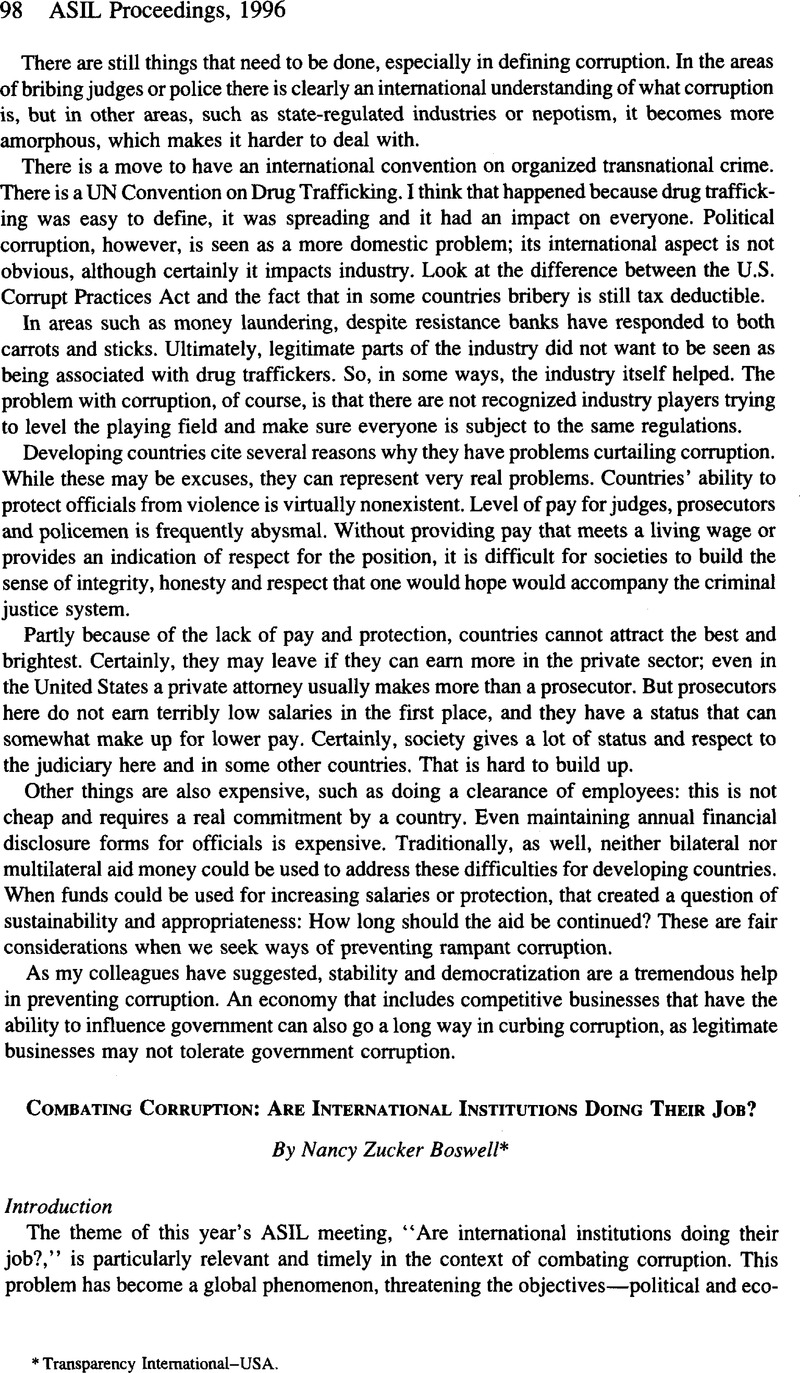No CrossRef data available.
Article contents
Combating Corruption Are International Institutions Doing Their Job?
Published online by Cambridge University Press: 17 February 2017
Abstract

- Type
- Kleptocracy and Democracy
- Information
- Copyright
- Copyright © American Society of International Law 2015
References
1 In a speech to last year's annual World Bank-IMF meetings, President James Wolfensohn stated that “roughly a quarter of the poorest countries’ debt is owed to multilateral institutions.“
2 The Foreign Corrupt Practices Act (FCPA), enacted in 1977, criminalizes payments to foreign officials (both elected officials and civil servants), political parties, or candidates to influence official actions and decisions to “obtain or retain business.“ The prohibitions are very broad, extending to payments to third parties. The FCPA also has strict accounting standards and disclosure rules. Currently, the United States is the only country to criminalize bribery of foreign public officials.
3 OECD Governments Agree to Combat Bribery, SG/PRESS (94)36.
4 Draft Recommendation of the Council of the OECD on the tax deductibility of bribes to foreign government officials. Report by the Committee on Fiscal Affairs.
5 Draft Inter-American Convention Against Corruption, Article VI, (February 13, 1996).
6 Id. Articles X-XIII.
7 Id. Article VIII.
8 Summit of the Americas, Plan of Action, Item 6.
9 The FTAA is comprised of the thirty-four democracies in the Western hemisphere participating in the Summit of the Americas. The framework described is according to a draft U.S. proposal.
10 The WTO Agreement on Government Procurement signatories include the EU members, the United States, Canada, Japan, Norway, Switzerland, Israel, and Korea. Taiwan and Singapore are in the process of acceding.
11 Preliminary Draft Convention on Corruption, Secretariat Memorandum prepared by the Directorate of Legal Affairs, Strasbourg, January 12, 1996.
12 The Fight Against International Corruption: What the European Union Can Do, Memorandum prepared by Transparency International Brussels, November 1995.
13 See, for example, Governance: Sound Development Management, Asian Development Bank, August 1995. The Asian Development Bank launched a Technical Assistance project in December 1994 to examine the extent to which the success of East Asian high-performers, with high rates of economic growth, correlates to the four elements of good governance; accountability, participation, predictability, and transparency.
14 Id. At 4.
15 See, for example, Governance, The World Bank's Experience, The International Bank for Reconstruction and Development, 1994, at 16.
16 At the launching of The World Bank Participation Sourcebook, the president indicated his strong commitment to promote participation by the people affected by development interventions in the decision-making process. February 1996.
17 Supra, note 13 at 23.
18 UN G.A. Res. 3514 (XXX) of December 15, 1975.
19 In 1976, the OECD issued a Declaration on International Investment and Multinational Enterprises, including antibribery Guidelines for Multinational Enterprises.
20 The International Chamber of Commerce, Rules of Conduct to Combat Extortion and Bribery, 1977.
21 The government of Singapore sent an unmistakable message when it recently banned five companies from future bidding on public projects for five years for alleged bribery in public sector bidding.
22 TI and its chapters do not investigate individual cases of corruption and remain nonpartisan. They work to minimize confrontation and politics and to raise public awareness and public pressure.
TI was founded in 1993 and is headquartered in Berlin's Advisory Council; members include Oscar Arias, Nobel Laureate and former President of Costa Rica, Richard von Weizacker, former President of Germany, former foreign and finance ministers, mayors and legislators, judges, lawyers, accountants, and professors from around the world. Funding comes from multilateral and bilateral development agencies, foundations, and the private sector, including over one dozen major multinationals, such as GE, Merck, Boeing, AIG, Enron, and Westinghouse.
23 TI has just completed its National Integrity Sourcebook, providing information that national chapters can use to design appropriate ways to address corruption. It covers public procurement reform, auditing agencies, ombudsmen, corporate codes of conduct and administrative reforms, as well as ways to achieve accountability through the judicial system, through public access to information and through increased involvement of civil society.
TI pioneered an AntiBribery Pact, an option to provide a mutually protective context in which to conduct honest public procurement. The CEOs of all bidders sign written commitments to abide by the same “clean no-bribery rules“ on a public procurement project and to disclose all commissions paid; the government agrees to accept bids only from participating companies, with appropriate provisions for monitoring and sanctions for violators.
24 The president of the Federation of German Industry has urged quick action, saying that “[T]he private sector has an immense interest in solving this problem because corruption not only increases the costs and hinders the competitiveness of our companies, but corruption can undermine our market economy system and finally even our economy.“ Press Release of the Federation of German Industry (BDI), Cologne, July 6, 1995.




